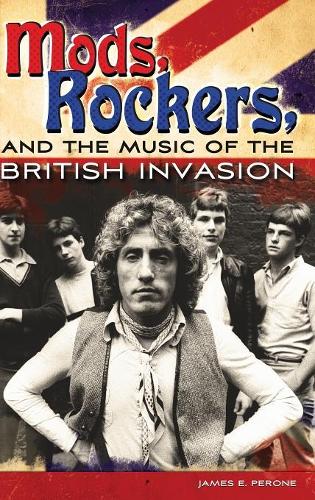
Mods, Rockers, and the Music of the British Invasion
(Hardback)
Publishing Details
Mods, Rockers, and the Music of the British Invasion
By (Author) James E. Perone
Bloomsbury Publishing PLC
Praeger Publishers Inc
30th November 2008
United States
Classifications
General
Non Fiction
European history
Social and cultural history
781.66094109045
Physical Properties
Hardback
224
Width 156mm, Height 235mm
482g
Description
Musical floodgates were opened after the Beatles' first appearance on The Ed Sullivan Show on February 9, 1964. Suddenly, the U.S. record charts, radio, and television were overrun with British rock and pop musicians. Although this British Invasion was the first exposure many Americans had to popular music from the United Kingdom, British pop and more specifically British rock and roll had been developing since the middle of the 1950s. Author James Perone here chronicles the development of British rock, from the 1950s imitators of Elvis Presley and other American rockabilly artists, to the new blends of rockabilly, R&B, Motown, and electric blues that defined the British Invasion as we recognize it today. Die-hard fans of the Beatles, the Who, and the Kinks will all want a copy, as will anyone interested in the 1960s more generally. May 1964 saw major gang-style battles break out in British resort communities between the Mods and the Rockers. The tensions between the two groups had been developing for several years, with each group claiming their own sense of culture and style. The Mods wore designer clothing, rode Vespa motor scooters, and shared an affinity for black American soul music, while the Rockers favored powerful motorcycles, greased-back hair, and 1950s American rock and roll. It was within this context that the sounds of the British Invasion developed. Mods, Rockers, and the Music of the British Invasion chronicles the development of British rock through the iconic artists who inspired the movement, as well as through the bands who later found incredible success overseas. In addition to analyzing the music in the context of the British youth culture of the early 1960s, Perone analyzes the reasons that the British bands came to so thoroughly dominate the record charts and airwaves in the United States. The contributions of Cliff Richard, Billy Fury, Johnny Kidd and the Pirates, Tommy Steele, the Tornados, Tony Sheridan, Blues Incorporated, and others to the development of British rock and roll are examined, as are the contributions and commercial and artistic impact of major British Invasion artists such as the Beatles, the Rolling Stones, the Dave Clark Five, the Yardbirds, Manfred Mann, the Who, the Kinks, and others. After investigating these groups and their influences upon one another, Perone concludes by examining the commercial and stylistic impact British rock musicians had on the American music of the time.
Reviews
This is a thoroughly engaging examination of the evolution of British popular music from the mid-1950s to the mid-1960s. Perone (Mount Union College) uses the seemingly contrasting youth subcultures of mods and rockers as a metaphor for analyzing the process of self-identification and self-actualization among disenfranchised urban youth in Great Britain during this period The most successful artists fused the music, fashion, and lingo of the rocker and mod subgroups to create a marketable image and sound that transcended mere imitation of US music icons to become creative, powerful forces in their own right, consequently shaping rock music history. Photos of key artists are included, along with notes and a selected discography. A listing of media (movies, recordings, television programs, etc.) that helped fuel the British invasion would have been useful. Recommended. All levels. * Choice *
The development of British invasion rock music is chronicled from the 1960s to modern times, documenting tensions between two very different resort communities the Mods and the Rockers. Each group claimed its own culture and style but it was the Rockers that entered America with the Beatles in 1964, leading a generation of vast musical change fueled by British influences. Any library strong in rock music history needs this. * Midwest Book Review *
Author Bio
James E. Perone is Professor of Music at Mount Union College, where he teaches American music and music theory, and chairs the Department of Music. He is the series editor for The Praeger Singer-Songwriter Collection, for which he has also written four volumes: The Sound of Stevie Wonder (2006), The Words and Music of Carole King (2006), The Words and Music of David Bowie (2007), and The Words and Music of Prince (2008). He is also the author of several Greenwood Press books, including Music of the Counterculture Era (2004) and Woodstock: An Encyclopedia of the Music and Art Fair (2005).
